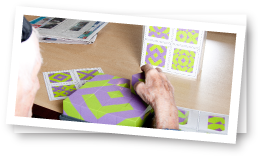Our Blog

February 19, 2013
Dementia and Alzheimer Caregivers support
As people with dementia lose their ability to perform daily tasks, the caregivers struggle to find new solutions to help with these daily activities. It is crucial for caregivers to maintain their emotional and physical health.
Caregivers must prepare themselves and understand what their loved ones are experiencing and seek support, which can be a big help.
You can support and nourish your loved one’s independence and stability, but cognitive and physical regression will ultimately require 24 hour care.
With this difficult outlook, caregiving can become all-consuming as your loved one diminishes over a period of years. Grief, depression, and anger are common, but anticipating and learning about the disease can reduce your frustration and prepare you for new challenges.
Because care giving is such hard work, you must learn to protect yourself first.
Take time to play.
Exercise.
Ask for help.
Count your blessings.
Practice relaxation techniques.
Keep a daily journal to record and reflect on your successes and losses.
Celebrate what is possible.
Understand the challenge.
Try to envision his/hers world.
Language skills are impacted early in Alzheimer’s disease. Speak to your loved one in a calm, loving, and simple (but adult) manner.
Remember the adage “your actions speak louder than words?” In spoken communication, most of the meaning comes from tone, gestures, and other forms of body language.
• Limit distractions and face your loved one to gain attention
• Use simple gestures, point, or touch gently to communicate your message
• Offer alternatives to help your loved one communicate a thought or preference
• Wait patiently for responses to show respect
• Listen with your eyes for cues to meaning
• Observe breathing to gauge emotional affect
• Look for permission to touch and soothe
• Remain calm and open to encourage and prompt
Look for support groups in your area, you will benefit from taking the time for yourself and learn you are not alone, share ideas and solutions and learn to allow yourself to take a break and seek help. If you neglect your own well-being it may affect the quality of care you provide.
Care givers bill of right!
1. To take care of my own health, spirit and relationships.
2. To seek help from others even though my care-receiver may object.
3. To accessible and culturally appropriate services to aid in caring for my care-receiver.
4. To get angry, and express other difficult feelings occasionally.
5. To accept help that is offered to me by others.
6. To receive consideration, affection, forgiveness and acceptance for what I achieve as a caregiver.
7. To take pride in what I accomplish and to applaud the courage it has sometimes taken to meet the needs of my relative, partner or
friend.
8. To protect my individuality and the right to make a life for myself that will sustain me in the time when my care-receiver no longer
needs my full time help.
9. To expect and demand increased awareness and support to find resources to aid me in caring for my relative, partner or friend.






